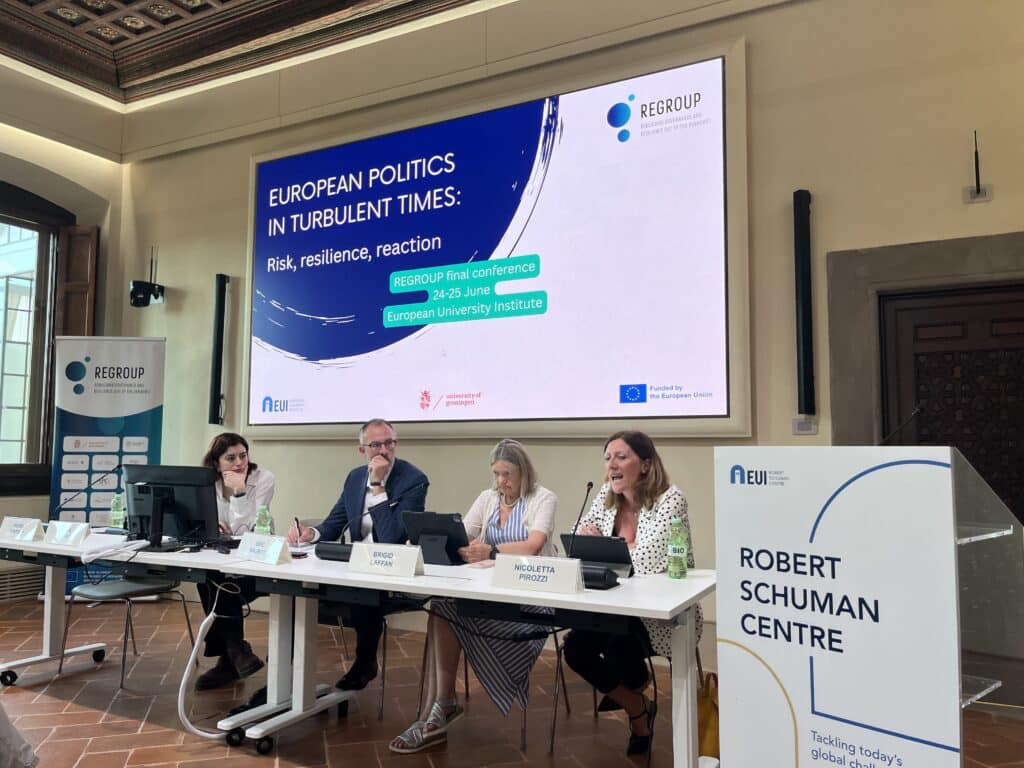Elsbeth Bembom | 29 July 2025
European politics in turbulent times: Lessons from the REGROUP final conference
On 24-25 June 2025, the European University Institute in Florence hosted the final conference of the REGROUP project titled “European politics in turbulent times: Risk, resilience, reaction.” Scholars and experts gathered to reflect on how recent crises, from the Covid-19 pandemic to current geopolitical tensions, are reshaping European governance, public trust, and democratic legitimacy.
Facing crises together
The conference opened with welcoming remarks by Piero Tortola (University of Groningen), scientific coordinator of REGROUP, who set the tone by stressing the importance of learning from the pandemic to better tackle current and future challenges, including the rise of populism.
In the keynote speech, Professor Maurizio Ferrera (University of Milan) examined how crises have influenced European integration. Drawing on lessons from the Eurozone and the Covid-19 crises, Ferrera highlighted two key tensions: Horizontal conflicts among EU member states, and vertical conflicts between national and supranational governance. He emphasized that effective crisis management needs both flexible policies and a shared commitment to preserving the European project itself.
Democracy under pressure
The first day of the conference came to a close with a roundtable discussion, moderated by Lorenzo Cicchi (European University Institute), which explored the question of democratic legitimacy during turbulent times.
Kalypso Nicolaïdis (European University Institute) reflected on the paradox that while the pandemic disrupted essential public spaces for civic deliberation, it also opened the door to a “citizen turn,” an opportunity to anchor democracy more deeply by connecting local engagement to European debates. Federico Fabbrini (Dublin City University) highlighted how institutional gaps surfaced during crises but noted the EU’s ability to quickly expand its role in areas like security and energy. Both stressed that deeper reforms, such as treaty changes to enable shared financing of defence, may be necessary to respond to new geopolitical threats.

Vivien Schmidt. Source: European University Institute
Lastly, Vivien Schmidt (Boston University and LUISS Guido Carli) added that while the EU earned public trust during the pandemic through swift, innovative policies like the Recovery and Resilience Facility, this momentum has slowed as member states hesitate to deepen fiscal integration further.
Together, the speakers painted a picture of an EU that, despite institutional constraints and fragile public trust, demonstrated resilience and adaptability in crisis—but whose future democratic legitimacy depends on sustaining these reforms, deepening citizen engagement, and addressing unresolved structural challenges.
The age of disinformation
The second day of the conference started with the roundtable, moderated by Piero Tortola (University of Groningen) on how digital technologies and the rise of misinformation are undermining democracy. The panelists agreed that social media platforms, once viewed as tools for democratic empowerment, have instead fostered polarisation and weakened public trust. Iva Nenadić (European University Institute) began by pointing to AI-driven content and fragmented media ecosystems as threats to shared facts.

Iva Nenadić. Source: European University Institute
Lars Rensmann (University of Passau) deepened this concern by arguing that the problem is not just disinformation itself but how digital platforms, motivated by profit, act as non-neutral gatekeepers. Their algorithms often amplify polarising content and hate speech, reinforcing echo chambers that weaken social cohesion and empower populist narratives.
Ilaria Capua, virologist and former member of the Italian Parliament, expanded the discussion by warning that disinformation extends beyond media and politics, eroding trust in science itself and leading to damaging policy decisions, illustrating how quickly harmful narratives can spread in today’s digital environment.
Finally, the panelists illustrated how disinformation threatens not only electoral outcomes but also the deeper foundations of knowledge, trust, and responsible governance in European democracies.
Europe at a crossroads
The final roundtable looked forward, with moderator Giulia Torchio (European Policy Centre) asking what kind of Europe can emerge from today’s crises. Brigid Laffan (European University Institute) opened by observing that questions of sovereignty and security have moved to the heart of European debate, especially as Europe faces a less reliable US ally and a more unstable global context. She suggests that Europe should strengthen its defence industry over the next decade to meet growing threats.

Giulia Torchio, Eric Maurice, Brigid Laffan, and Nicoletta Pirozzi. Source: REGROUP
Nicoletta Pirozzi (Istituto Affari Internazionali) expanded on this by highlighting how, despite early fragmentation, the EU has shown impressive unity during recent crises, mobilising resources in response to both the pandemic and Russia’s invasion of Ukraine. Yet she warned that the EU now faces a critical turning point: either reform its governance, security, and enlargement policies to emerge stronger and more cohesive, or risk fragmentation and weakened influence if decisive leadership fails to materialise. Lastly, Eric Maurice (European Policy Centre) added a note of caution, as he pointed to growing internal challenges: Declining US support, institutional gridlock, and rising far-right influence within the European Council could make consensus harder to achieve.
Looking ahead
Closing the conference, Piero Tortola thanked participants and tied discussions back to the core aim of REGROUP: Understanding how Europe can navigate turbulent times while preserving democracy and integration. He emphasized the vital role of research and collective reflection in guiding Europe forward.
The conference made clear that Europe’s future depends not only on policies and treaties but on citizens, institutions, and scholars working together to reinforce trust, resilience, and shared purpose.
